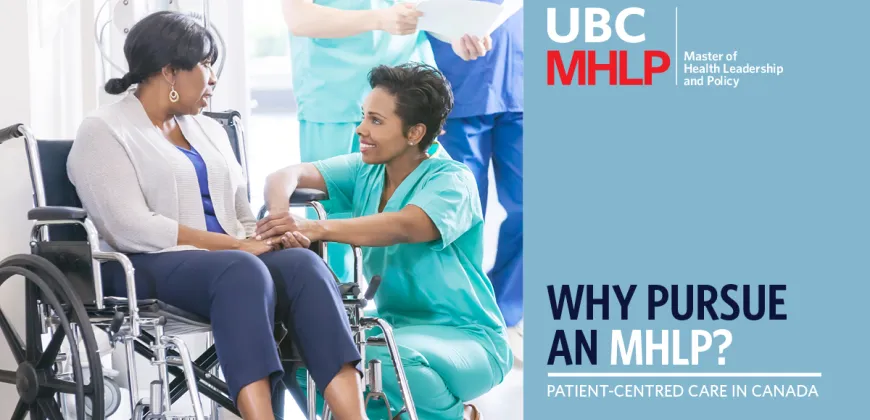How do you develop the skills to be an effective leader in healthcare?

Becoming a leader in healthcare is a process: it takes time to develop the knowledge, skills and experience needed to effectively and confidently head up interdisciplinary teams to have a far-reaching impact on patient care within your organization and health care sector. “Developing leadership skills in health care requires taking a step back from the day-to-day to evaluate what you want to bring to the health environment,” says Justin Bull, academic director of UBC’s Master of Health Leadership and Policy (MHLP).
“Do you want to manage complex projects? Lead new innovative programming? Recentre the patient in your care procedures? Whatever your north star, you’ll likely need a new set of skills.”
As explored below, you may be able to develop some of those skills in your current position. But to gain the broader perspectives on policy, management and leadership, investing in a master’s degree is generally your best option. This is reflected in the many healthcare leadership positions that require such a credential.
Find ways to boost your visibility and responsibility
Your current position might not include “team lead” or “manager” in the title. But that doesn’t mean you can’t find ways to take more of a leadership role on teams and projects. Look around at your workplace and see if there are ways you can expand your zone of influence.
Can you volunteer for a position on a committee? Are there projects in areas that overlap with your expertise that you could be a part of? Talk with your higher-ups about your desire to stretch yourself.
This shows initiative and it also enables you to interact with a more diverse group of colleagues – a great way to open doors to new opportunities that will develop you as a leader in healthcare. Are there conferences or other industry-focused events you can attend as a participant or presenter? These are fantastic opportunities for learning, gaining presentation and networking skills, and staying on top of the latest advances in your field. Being actively engaged in your industry also indicates to others that you have a proactive work ethic.
Develop essential skills for healthcare leadership
Leaders in healthcare require a different skill set than health-care practitioners, including, says Dr. Bull, “the ability to understand organizational culture, financial realities and project management; the ability to articulate a compelling vision and persuade others of its merits; and the openness and perspective to connect with diverse stakeholders and help understand what motivates them, or what they require.”
Developing this kind of knowledge – and the leadership skills that go with it – requires carving out the time to invest in additional education.
The MHLP is one option to consider. Unlike other master's programs, the MHLP is an interdisciplinary master’s degree that combine health-care education taught by world-renowned experts - from UBC’s School of Nursing with business education taught through one of Canada’s most acclaimed business schools. The result? A balanced education that deepens your health-care knowledge and your leadership and business skills – helping you stand out as you advance into the next stage of your career.
Laying the groundwork for becoming a healthcare leader
One required business course provides an overview of six core business competencies of accounting, organizational behaviour and human resources, finance, marketing, business technology management and professional development. It’s a very hands-on and intense three weeks, with students working with financial statements, developing marketing plans, practicing coaching skills and handling conflict through role-playing exercises.
These tangible skills lay the groundwork for becoming a healthcare leader.
“The professional development and organizational behaviour modules changed my perspective on team effectiveness,” says Agata Stanielewicz, who completed her MHLP in Clinical Education.
“I’m now much more aware of group think and cognitive bias, and I’ve learned how to be a stronger leader through active listening. In the professional development module, we practiced our coaching skills through a role play where you coached your partner to come up with a solution or goal they wanted to achieve in their own work situation.”
Gaining the credential and confidence to lead in your field
If you are looking for a way to develop the skills to be an effective healthcare leader and to gain both industry knowledge and leadership skills, a program like the MHLP could be worth considering.
The curriculum is designed to help you develop expertise in your field, strengthen your non-technical skills, become a better communicator, and strengthen your ability to think creatively and critically. You will have numerous opportunities to practice these essential leadership skills.
You’ll also be learning with classmates with diverse professional and personal backgrounds, which helps you gain confidence when being on – or leading – an interdisciplinary team in your professional environment. As Agata noted, “When you’re leading a team in your professional role, you have to work with people outside your area of specialty, and that might feel uncomfortable at first. This course gave me the opportunity to open my mind to new problem-solving approaches I didn’t know existed.”
Invest in professional development
Alumni of the program tell us that when they return to their careers, they have greater confidence as leaders – and the jump in responsibility in their roles shows that their employers do too. When you’re seeing your next position, a master’s degree from a world-renowned university like UBC can set you apart from other candidates. It tells employers that you have what it takes to succeed in a challenging interdisciplinary environment, are comfortable taking risks and that you are committed to investing in your professional development. In short: it shows that you are ready to lead.


